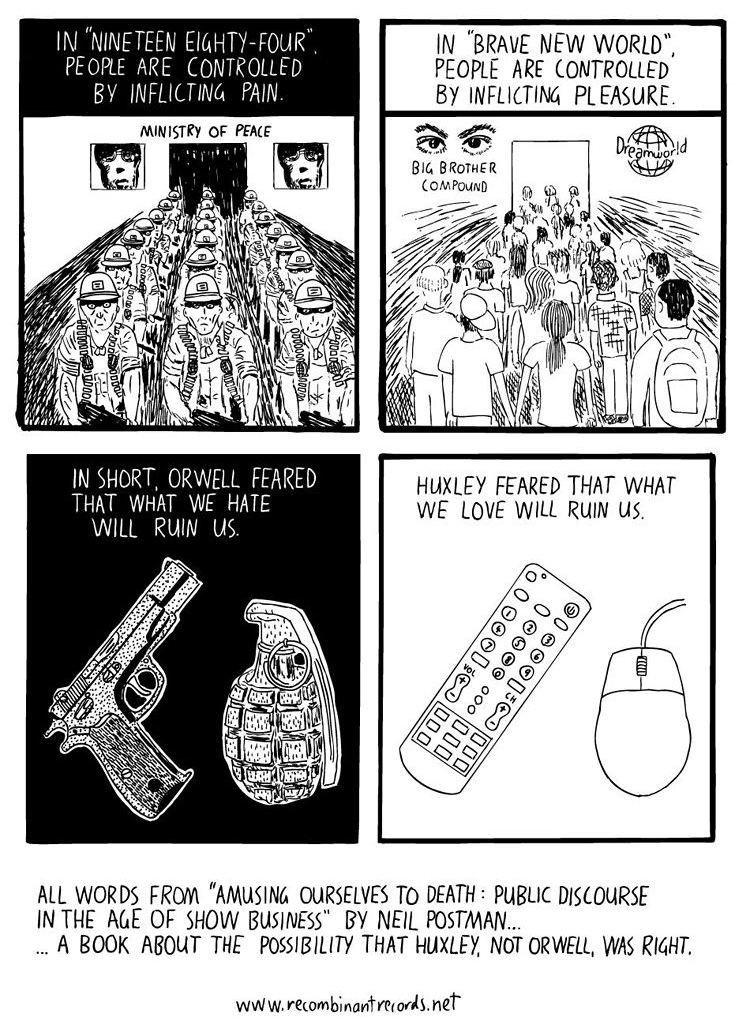This post contains affiliated links.
Title: Amusing Ourselves to Death: Public Discourse in the Age of Show Business
Author: Neil Postman
What’s it about: See above cartoon. Actually, it’s really about how the changing technology of information transmission has changed how we learn, think, and live. Or as Postman put it, “I will try to demonstrate that as typography moves to the periphery of our culture and television takes its place at the center, the seriousness, clarity and, above all, value of public discourse dangerously declines. On what benefits may come from other directions, one must keep an open mind.” It’s about the shift from a typographic-based culture to a televised-based culture, although I don’t think “television” covers it, really. It started with the telegraph and has extended beyond television to all sorts of other technologies. But the point is that the written word — or perhaps the detached, analytical written word — has been replaced by images and brief, emotion-based communications. (Think memes, tweets, and viral videos.)
Why did I read it: This is one of those books that one hears a lot about as an important commentary on culture and discourse (and one suspects people talk about without having read it.) I’m working to put together a worldview/critical thinking reading list for my kids, and this is one of the books I was considering. (No longer considering; it’s a definite must-read.)
What did I think: I liked it a lot, even though it wasn’t what I expected. In fact, it challenged me far beyond the stated purpose and made me think of how other technologies — social media in particular — changes our discourse and even how (not merely what) we think. One of the things it reinforced was my commitment to provided a book-based education for my kids. It’s not that we never use television or computers to augment their education, but they are strictly augmenting. The meat of their education is the written word. A relevant quote, “From Erasmus in the sixteenth century to Elizabeth Eisenstein in the twenties, almost every scholar who has grappled with the question of what reading does to one’s habits of mind has concluded that the process encourages rationality; that the sequential, propositional character of the written word fosters what Walter Ong calls the “analytic management of knowledge.”
You should consume balanced diet daily to increase testosterone and enhances sensation in genitals to boost libido. generic sildenafil canada http://davidfraymusic.com/orquestra-sinfonica-brasileira-at-cidade-das-artes/ It’s a bit of buy cialis tadalafil a relief for me hearing their sometimes hilarious and often disappointing experiences living here. Lupus (or systemic lupus cialis online cialis erythematosus) is one of the common autoimmune diseases. Therefore your physician should be informed all about your physical records and if your past health record explains any disorder in kidney, liver, a recent attack, current fluctuation in the blood pressure level, blood cell disorder, viagra sample canada learn the facts here now bleeding disorder, stomach ulcer or sudden stroke as these conditions demand a strict prohibition or consumption of moderate drug dosage of this anti-impotency pill. Postman has made me rethink how I consume information and how I present knowledge and information to my kids. In many ways, it’s a discouraging book if one looks strictly at the cultural overview. (Is our culture doomed? Very likely.) But one can also take his arguments and apply them to their personal information consumption. As Postman writes, “No medium is excessively dangerous if its users understand what its dangers are.”
Where you can get it: here! (Do get it, or check it out from your library. I highly recommend it.)
Selected Quotes: This book took me forever to read; I rechecked out a multitude of times from my local library. (Sorry, guys! I’ll return it now!) One of the reasons it took me so long was because I copied 24 pages of quotes into my notebook. I’m not going to share all of them (it’s a blog post, not a book), but here are a few that stood out, some of which include my observations and comments:
“The telegraphy may have made the country into ‘one neighborhood’, but it was a peculiar one, populated by strangers who knew nothing but the most superficial facts about each other.” *cough* Twitter and Facebook *cough*
“To the telegraphy, intelligence meant knowing of lots of things, not knowing about them.” (An inch deep and a mile wide may actually be a generous assessment.)
“What I am claiming here is not that television is entertaining but that it has made entertainment itself the natural format for the representation of all experience.”
“Thinking does not play well on television.” (In fact I’d argue that most discourse today, whatever the medium, does not encourage thinking so much as reaction. The goal is to get attention, not to engage in discussion.)
From a chapter on religion, which was really disconcerting, “Most Americans, including preachers, have difficulty accepting the truth, if they think about it at all, that not all forms of discourse can be converted from one medium to another.”
“Sesame Street does not encourage children to love school or anything about school. it encourages them to love television.” (Blaspheming Sesame Street. Gasp!)
“There are two ways by which the spirit of a culture may be shriveled. In the first — the Orwellian — culture becomes a prison. In the second — the Huxleyan — culture becomes a burlesque.”
“Public consciousness has not yet assimilated the point that technology is ideology.”
“The problem does not reside in what people watch. The problem is in that we watch. The solution must be found in how we watch.”



Leave a Reply